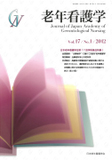Japanese
English
- 販売していません
- Abstract 文献概要
- 参考文献 Reference
抄録
本研究の目的は,都内の介護保険施設3施設の看護職,介護職,管理栄養士における要介護高齢者の脱水予防のためのアセスメント項目ならびに支援方法の実態と課題を明らかにすることであった.調査方法は,回収数420(回収率15.1%),有効回答数412(有効回答率98.1%)からなる質問紙法(看護職168人,介護職160人,管理栄養士84人)と11人のフォーカスグループインタビュー法による並行的ミックス法を用いた.3職種間での脱水のアセスメントでは,看護師と介護職は食事状況や健康状態の観察を毎日実施し,管理栄養士は他職種からの情報収集によって把握していた.また情報共有の必要性があると判断した脱水のアセスメント項目においても専門性の違いがみられた.水分摂取の支援方法に関する課題として,対象者側の食欲不振,嚥下困難・障害等の身体的要因と,支援側の適切な食物形態・食品の選択,食事介助技術等があった.支援側の高齢者への安全性,尊厳ある水分摂取援助の方法について教育的課題が示唆された.
The purpose of the present study was to clarify the challenges to the methods by which nurses, care workers and registered dieticians provided water in order to prevent dehydration in frail elderly at long-term care facilities. The methods of data collection were questionnaire and focus group interview. The subjects of the questionnaire were 168 nurses (40.2%), 160 care workers (38.1%) and 84 registered dieticians (20.0%), and 412 subjects (14.8%) responded with valid answers. The subjects of the focus group interviews were 3 nurses, 5 care workers and 3 registered dieticians. The results were as follows.
The nurses and the care workers carried out observation of the elderly people's meal situation and their health condition every day with an assessment of dehydration.
The registered dieticians collected data about the health status of elderly from other professionals.
The main problems from the side of the elderly were several physical factors, such as loss of appetite, swallowing difficulty, dysphagia and low intake of water among older persons with dementia and terminal disease, while problems from the side of professionals were selection of unsuitable forms of food and low level of meal care skill.
A form of support accompanied by various resources, such as introduction of jelly foods and their favorite food for prevention of dehydration, was considered among professionals. On the other hand, there were many problems with the selection of inappropriate forms of food, lack of skill in giving water, weakness of risk assessment and low safety of meal environment from the assistance side. It was suggested that the care skill of giving water incurred challenges to the individuality and dignity of elderly people, and professional education in this regard is required at long-term care facilities in the future.
Copyright © 2012, Japan Academy of Gerontological Nursing All rights reserved.


